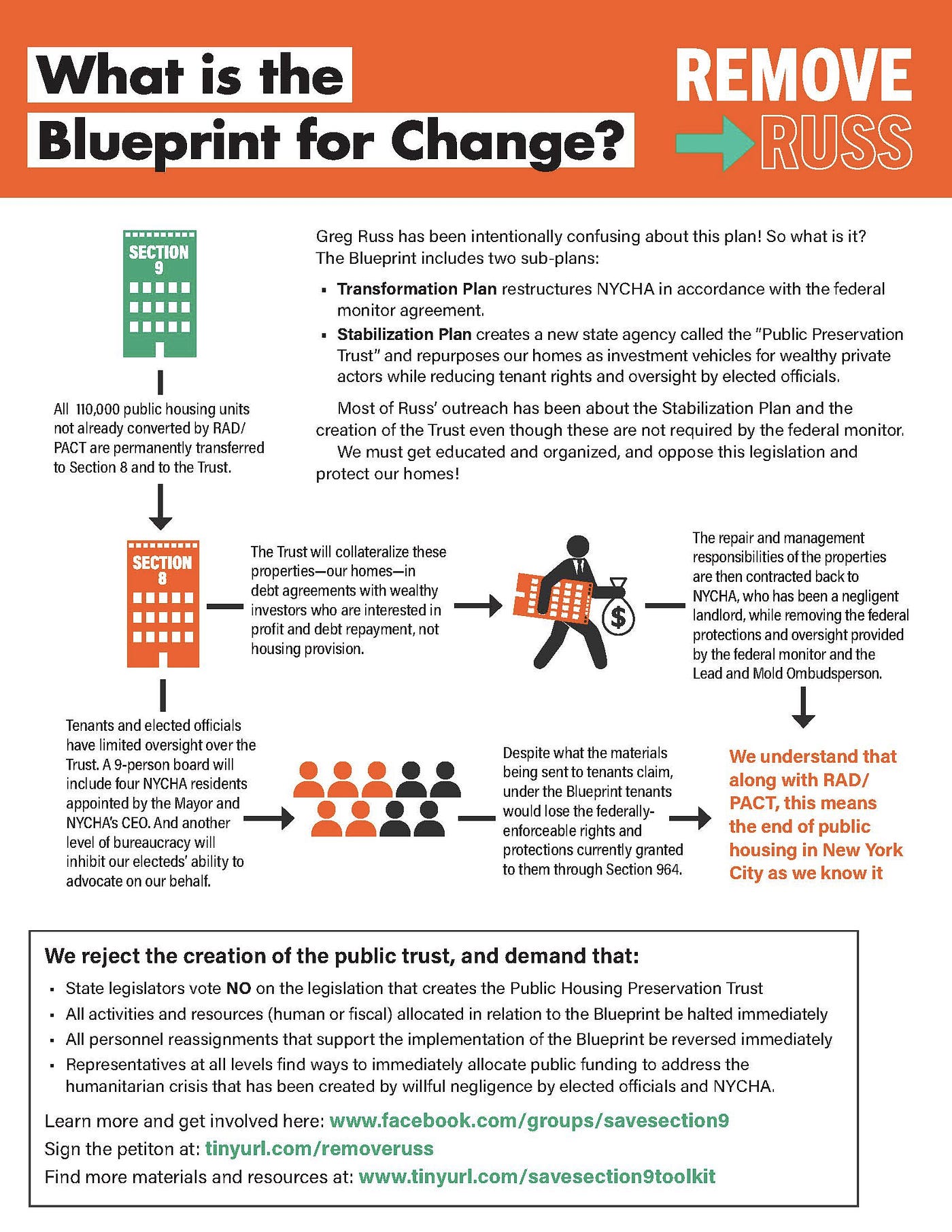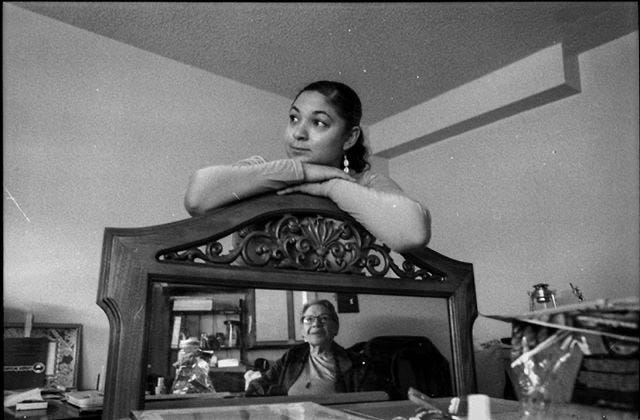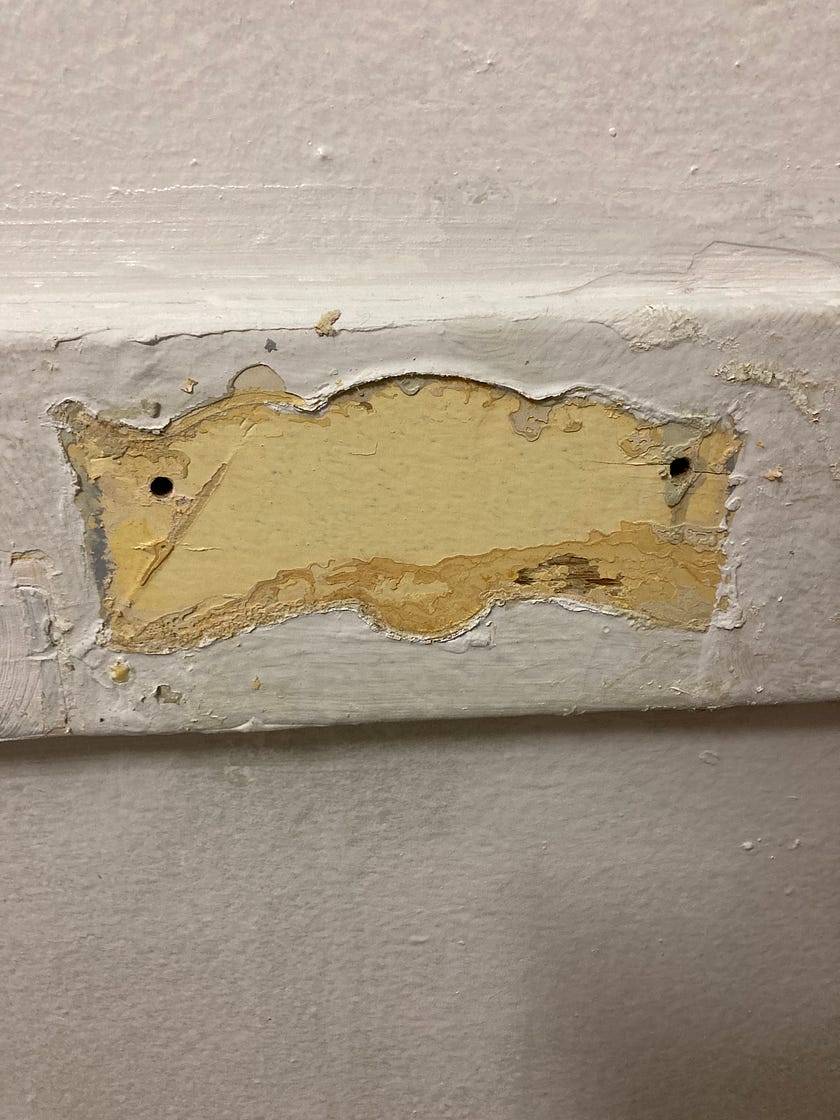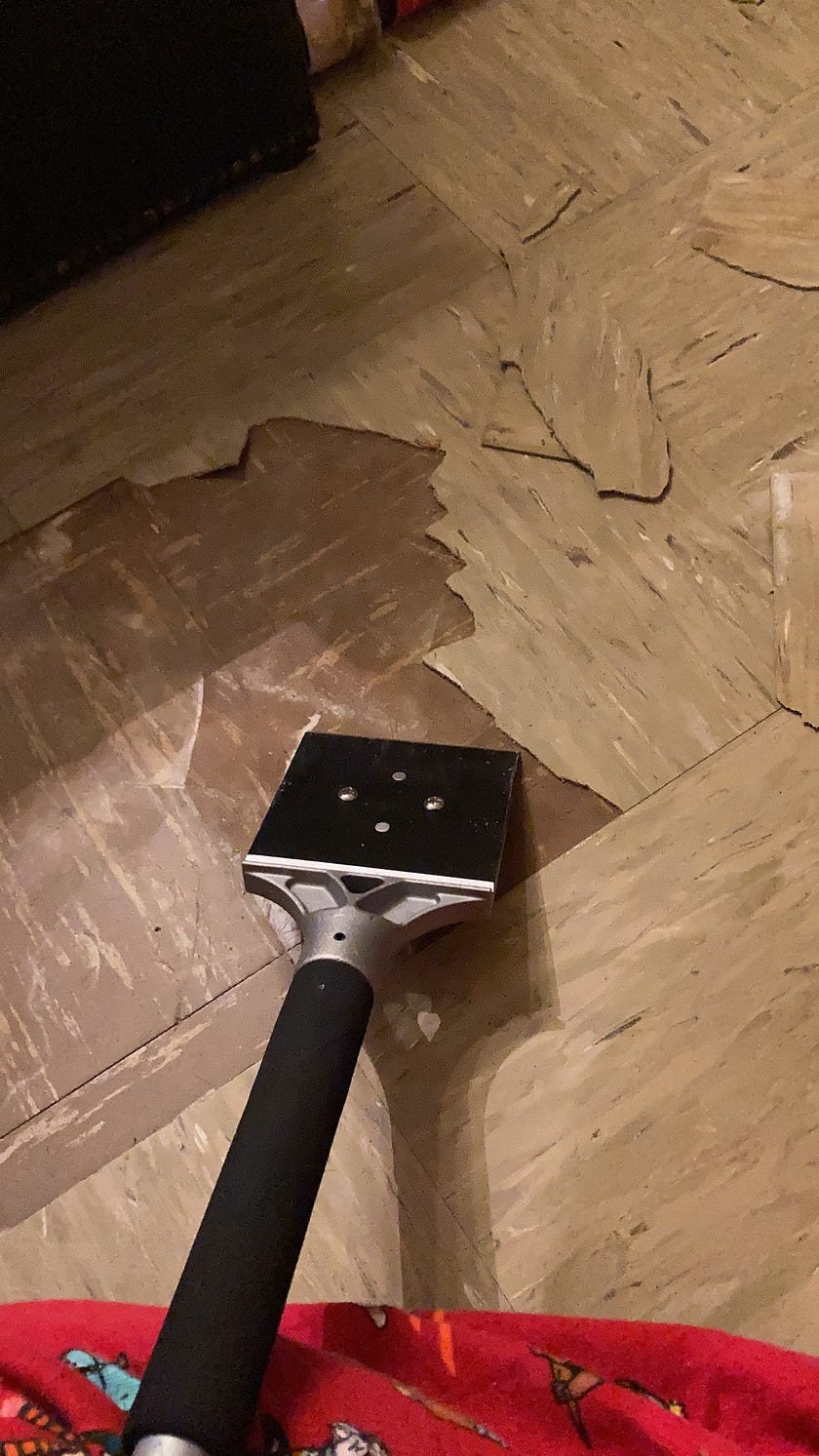Blue tiles and Blueprints.
Recently I decided to paint my apartment. When I began this process, I didn’t anticipate that I would be fighting for the future of public housing at the same time. Tackling years of abandonment, while fighting to save Section 9 housing in New York city was an emotional whirlwind. But I found solace in a small, blue, corner tile. Before taking this challenge on I never noticed the blue tile. I haven’t noticed much since December.
My grams, Carmen “Mamuchi” Perez Abreu passed away in December due to COVID complications. After spending seven weeks in the hospital, she came back home. Disoriented, but excited. While she was away, I had done everything I could to make our home welcoming. That Thursday felt like a lifetime of Christmas Eves (we’re Dominican so we don’t wait for Jesus’s birth to open gifts). The following Tuesday she testified against the Blueprint proposal. She was tired, and weaker than I had ever seen her but she understood that the Blueprint was a threat to something she loved, public housing.

The Blueprint converts Section 9 in New York City, currently managed by the New York City Housing Authority (NYCHA), to a diluted version of Section 8. During our testimony grams spoke about the frustration she felt living in an apartment that had not been painted for almost a decade. We have a leak in our ceiling, one that has been dripping for about a decade. NYCHA refused to paint while we had an active leak, so we kept waiting… this is why every wall that is now patched, and painted is so bittersweet.
To grams, life in NYCHA was worth fighting for, failures and all. She loved living here, she wanted to end her life here. Over the 33 years that she lived here I fell in love with NYCHA too. But this love has been toxic for a while. Our apartment has tested positive for mold, and lead. I’ve been on allergy injections for three years to cope with the environmental toxins my apartment holds. My dog Brownie just started allergy injections for most of the same things. This didn’t happen overnight.
Public housing was abandoned by the federal government during the Reagan years. I often have to tell this story, how Reagan vilified the poor by introducing the term “Welfare Queen” to mainstream America. In doing so he ensured that folks wouldn’t support programing that led to upward mobility. Key among these was Section 9. Public housing had been created to eradicate slums, and to support the families lucky enough to get an apartment within public housing. The growth of these families was paramount to measuring success. This is visible in the construction materials I have been discovering in my apartment.
When Mitchel Houses was built in the mid 60’s everything was done by hand, and I want to assume it was done with love. Tradespeople built these monuments to progress with their bare hands. Our walls slant, our floors dip, but when you imagine the someone spending their day building homes intended to lift Americans out of slums you can’t help but long for the right soundtrack. So how did a system intended to rescue those living in slums create the largest slumlord in America’s history? Racism.
By the time Reagan began flirting with republican voters Italian and Irish beneficiaries had moved out of public housing, and headed to the suburbs. But public housing was still shaped by the federal policies that aimed to uphold segregationist policies. White flight was complemented by a shift towards funding for home ownership programs that mostly excluded people of color. Left behind were towers that began seeing less funding, depended on subsidies and began housing folks with more needs than those that lived in these homes before. After years of limiting access to public housing to people of color, and single heads of households the gates were opened.
Two years after Mitchel Houses opened in 1966 NYC stopped giving a dam about public housing. Middle class tenants were encouraged to move out, or evicted. NYCHA abandoned requirements of employment, stability and orderliness and stopped considering the “morals of the applicants”. Without rules, funding, and resources public housing turned into America’s ghettos. These ghettos didn’t attract much support and were left out of the vision for America. Couple this disdain with mismanagement and corruption and you have NYCHA.
These dire conditions have made an Obama era pilot, locally called RAD, run amok. At the peak of the pandemic NYCHA Chair Gregg Russ introduced the Blueprint proposal, RAD on meth. The blueprint converts section 9 (public housing) into unit sponsored section 8, creates a trust, and leaves NYCHA as our property manager. We lose our federal rights and privileges, some of which we haven’t experienced since the 70’s. So, at the peak of COVID tenants started organizing.
I used my background in policy and development to educate folks on policy, engage tenants across NYC and activate them. I did as my grandfather died from cancer, my neighbors died from COVID and I struggled with autoimmune conditions. In November COVID finally caught up to grams and I. December 29 I lost her. Coming home without her made the apartment we shared a depository of angst. Every crack on the walls, every broken tile felt like a reminder of time’s betrayal. To distract myself from the pain I decided to work on the signs of disinvestment.
I hired our local Bob Villa and began throwing color up.
Meanwhile, Russ hired a local consultant at the cost of $200,000 to convince tenants to support the legislation instead of replacing our ventilation systems after being warned that not doing so would lead to higher instances of COVID infections and deaths within NYCHA. Because our unit had not been properly maintained I expected the process to be difficult. I wanted every nail hole filled. Every wall evened out. when it came to the bathroom, I wanted to clear the signs of poor workmanship. I stripped paint from the tiles inch by inch. In doing so I found the history of this unit, of public housing.
Our bathroom had been beige, blue, white, yellow! Each layer reminded me that the one person I wanted to share this colorful discovery with was gone. Each layer spoke of a family living in a home they could afford! It spoke of families being rescued from slums in the lower east side. It spoke of upward mobility. It spoke of the promise of public housing. And how that promise had been broken.
Grams would tell me about the good old days. You could sit in the courtyard. Spend time at the senior center. Garden. Thrive. Her death left me alone, and in a home that reminded daily that people like us didn’t matter. Imagine losing the person that mattered most, and having wall cracks that mocked your heartache. Floor tiles that heckled you as you walked between memories. This home became a stranger without her and I didn’t recognize what it had become when her absence amplified shadows and stains. NYCHA uses a shade of beige that must be called despair and our leak had created cracks that felt like the breaks in my heart.

In this state I longed to undo what had been poorly done. Over the years NYCHA stopped using inhouse painters and began contracting painters. These painters sloppily covered testaments to American capabilities. Imagine my surprise when my stripping uncovered that our toilet paper holder is made from stainless steel! But my heart broke, and soared when I uncovered blue corner tiles.


I’m a sucker for details, and old homes. But I had never equated my home with a place worth restoring. That’s until I dropped some stripper on the corner of the tiled baseboard in our bathroom. In that corner I found a tiny triangle shaped tile. I was stunned by its presence. For 30 years grams home had been my weekend and summer home. I began living with her three years ago when her age started to slow down her swagger and she began needing me more. I looked at these tiles all the time. Not once did I consider that they could be original, or be a testament to why the Blueprint proposal needs to be killed, and Russ needs to be fired.


That blue tile, our stainless-steel finishes, our brass knobs… all of these pieces speak to a time when those making decisions for public housing wanted it to last. Public housing was equipped with the tools and resources to be timeless. We recognized as a country that affordable housing was essential for folks to thrive. I don’t know when we forgot this lesson but folks like me have been paying the price.


Russ is the embodiment of everything that is wrong with our policies on housing in America. His proposal will take tax payer Section 8 vouchers, use them (and NYCHA’s assets) as collateral to accumulate debt, and then “repair” our units. The debt is held by a trust which is allowed to seek bank notes and bonds. If at any time the debt becomes unmanageable investors can eventually seize all of NYCHA’s assets. Confusing right? There is an alternative, NYCHA could work with the federal government to get funding via Section 9 which is also funded by taxpayers. Period.
Funding Section 9 is cheaper for tax payers, maintains tenant protections only afforded to Section 9 properties, and is what tenants want. Yet on May 21st 2021 Senator Kavanagh introduced an updated version of the Blueprint legislation. This gave tenants and allies until June 7th to kill the bill. On May 22nd I launched a campaign with NYCHA tenants and allies “Remove Russ and Kill the Bill”. We’ve been gathering signatures online, and in person at family days every weekend. It is a daunting task, but one that I can’t turn away from.


There’s no doubt this campaign, now Save Section 9, is taking a huge toll on me, and everyone working on it. Those higher deaths have kept us in a constant state of mourning, and denial. The tenants involved in this fight have spent the entire pandemic fighting for homes that are a hazard to our mental and physical health. I wish each of them could find a blue tile. Because that blue tile… it has been there, holding on, waiting to be uncovered for almost 55 years. So, the least I can do is share it with ya’ll in the hopes that the next time you walk by a public housing development you can see past the layers of racism, over policing, underfunded school kids and see how each of us is as precious as a tiny, triangular, blue, corner tile…
